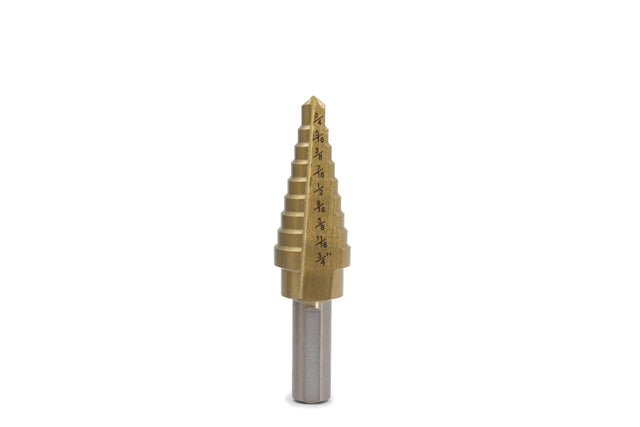When it comes to drilling precise holes in a variety of materials, the step drill bit stands out as one of the most versatile and efficient tools available. Whether you're a seasoned professional or a passionate DIY enthusiast, having the best step drill bit in your toolkit can make a world of difference in the quality and speed of your work. The step drill bit, with its unique design and multi-step cutting edges, offers the ability to drill multiple hole sizes with a single tool, making it an indispensable choice for tasks ranging from metalworking and woodworking to plumbing and electrical installations.
Step drill bits are engineered to drill holes of various diameters in a single pass, without the need to change bits or stop to reposition the tool. Unlike traditional twist drill bits, which are designed to drill a single size hole, step drill bits feature a series of steps or graduated rings along the shaft. These steps gradually increase in diameter, allowing the user to drill progressively larger holes with each pass. This design makes the step drill bit incredibly efficient for tasks that require multiple hole sizes, such as creating holes for different-sized fasteners or components, as well as for drilling holes in materials with varying thicknesses.
The versatility of a step drill bit shines through when it comes to its ability to work with different materials. It is commonly used for drilling through thin metal sheets, plastics, and even wood, depending on the type of bit and the material being worked on. One of the main advantages of a step drill bit is that it produces clean, precise holes with minimal burring or material deformation. The stepped design helps to prevent the bit from wandering off-center, a common issue when using standard drill bits, which ensures that the hole remains consistent and accurately sized.
In addition to their ability to drill multiple hole sizes, the best step drill bits are designed with materials and coatings that enhance their performance and durability. High-speed steel (HSS) is a popular material choice for step drill bits, as it provides a good balance of strength, heat resistance, and affordability. For tougher jobs or harder materials, step drill bits made from cobalt steel or titanium-coated HSS offer superior longevity and heat resistance. Cobalt steel bits, in particular, are ideal for drilling through tough metals like stainless steel, while titanium coatings reduce friction and increase the lifespan of the bit, especially when used on hard or abrasive surfaces.
Another key factor to consider when choosing the best step drill bit is the number of steps it offers. The more steps a bit has, the more versatile it becomes for different applications. However, more steps also mean a longer and possibly more expensive bit. For most general-purpose tasks, a step drill bit with a range of 3 to 4 steps is typically sufficient. For projects requiring a wide range of hole sizes, a bit with 6 or more steps may be necessary. It's important to match the number of steps to the specific needs of the job to ensure the best performance.
The design of the step drill bit also contributes to its ability to provide clean and accurate results. Many of the best step drill bits feature a split-point tip, which helps to reduce the risk of the bit walking or slipping when starting a hole. This is particularly useful when drilling into materials like metal, where the bit tends to skate along the surface if not properly centered. The split-point design helps to stabilize the bit and ensure a smooth, controlled drilling process from start to finish.
In addition to their precision and versatility, step drill bits are also prized for their speed. Because they can drill multiple hole sizes without the need for changing bits or stopping to adjust, they significantly reduce the amount of time spent on a drilling task. This makes them especially valuable in commercial or industrial applications where time is critical, as well as for DIY projects that demand efficiency and convenience.
When it comes to using a step drill bit, there are a few key considerations to keep in mind to ensure optimal results. First, it's important to use the right drill speed for the material you're working with. Slower speeds are generally better for harder materials like metal, while higher speeds are suited for softer materials such as plastic or wood. Additionally, applying consistent pressure and allowing the bit to do the work will help maintain the precision of the hole and prolong the life of the bit. It's also worth noting that step drill bits work best when drilling through thinner materials; for thicker materials, you may need to start with a smaller pilot hole before using the step drill bit to achieve the desired size.
The best step drill bits are an essential tool for anyone who values precision, efficiency, and versatility in their work. Whether you are working on a small home improvement project or tackling a large industrial task, the step drill bit allows you to achieve multiple hole sizes with ease, eliminating the need for frequent bit changes and reducing the time spent on each job. By investing in a high-quality step drill bit made from durable materials like HSS, cobalt steel, or titanium-coated HSS, you can ensure that your drilling tasks are completed quickly, accurately, and with a professional finish. With its ability to tackle a wide variety of materials and hole sizes, the step drill bit is truly a must-have tool in any toolkit.

